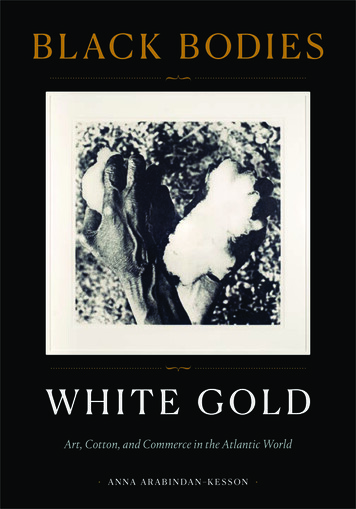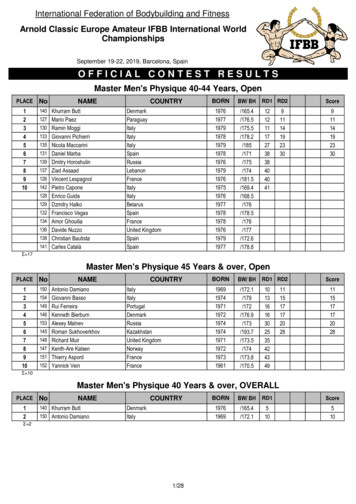
Transcription
Anna KareninaLeo TolstoyTranslated by Constance GarnettThis eBook is designed and published by Planet PDF. For more freeeBooks visit our Web site at http://www.planetpdf.com/.
Anna KareninaPART ONE2 of 1759
eBook brought to you byAnna KareninaCreate, view, and edit PDF. Download the free trial version.Chapter 1Happy families are all alike; every unhappy family isunhappy in its own way.Everything was in confusion in the Oblonskys’ house.The wife had discovered that the husband was carrying onan intrigue with a French girl, who had been a governessin their family, and she had announced to her husbandthat she could not go on living in the same house withhim. This position of affairs had now lasted three days, andnot only the husband and wife themselves, but all themembers of their family and household, were painfullyconscious of it. Every person in the house felt that therewas so sense in their living together, and that the straypeople brought together by chance in any inn had more incommon with one another than they, the members of thefamily and household of the Oblonskys. The wife did notleave her own room, the husband had not been at homefor three days. The children ran wild all over the house;the English governess quarreled with the housekeeper, andwrote to a friend asking her to look out for a newsituation for her; the man-cook had walked off the daybefore just at dinner time; the kitchen-maid, and thecoachman had given warning.3 of 1759
Anna KareninaThree days after the quarrel, Prince StepanArkadyevitch Oblonsky—Stiva, as he was called in thefashionable world— woke up at his usual hour, that is, ateight o’clock in the morning, not in his wife’s bedroom,but on the leather-covered sofa in his study. He turnedover his stout, well-cared-for person on the springy sofa,as though he would sink into a long sleep again; hevigorously embraced the pillow on the other side andburied his face in it; but all at once he jumped up, sat upon the sofa, and opened his eyes.‘Yes, yes, how was it now?’ he thought, going over hisdream. ‘Now, how was it? To be sure! Alabin was giving adinner at Darmstadt; no, not Darmstadt, but somethingAmerican. Yes, but then, Darmstadt was in America. Yes,Alabin was giving a dinner on glass tables, and the tablessang, Il mio tesoro—not Il mio tesoro though, butsomething better, and there were some sort of littledecanters on the table, and they were women, too,’ heremembered.Stepan Arkadyevitch’s eyes twinkled gaily, and hepondered with a smile. ‘Yes, it was nice, very nice. Therewas a great deal more that was delightful, only there’s noputting it into words, or even expressing it in one’sthoughts awake.’ And noticing a gleam of light peeping in4 of 1759
Anna Kareninabeside one of the serge curtains, he cheerfully dropped hisfeet over the edge of the sofa, and felt about with them forhis slippers, a present on his last birthday, worked for himby his wife on gold-colored morocco. And, as he haddone every day for the last nine years, he stretched out hishand, without getting up, towards the place where hisdressing-gown always hung in his bedroom. Andthereupon he suddenly remembered that he was notsleeping in his wife’s room, but in his study, and why: thesmile vanished from his face, he knitted his brows.‘Ah, ah, ah! Oo!.’ he muttered, recalling everythingthat had happened. And again every detail of his quarrelwith his wife was present to his imagination, all thehopelessness of his position, and worst of all, his own fault.‘Yes, she won’t forgive me, and she can’t forgive me.And the most awful thing about it is that it’s all my fault—all my fault, though I’m not to blame. That’s the point ofthe whole situation,’ he reflected. ‘Oh, oh, oh!’ he keptrepeating in despair, as he remembered the acutely painfulsensations caused him by this quarrel.Most unpleasant of all was the first minute when, oncoming, happy and good-humored, from the theater, witha huge pear in his hand for his wife, he had not found hiswife in the drawing-room, to his surprise had not found5 of 1759
Anna Kareninaher in the study either, and saw her at last in her bedroomwith the unlucky letter that revealed everything in herhand.She, his Dolly, forever fussing and worrying overhousehold details, and limited in her ideas, as heconsidered, was sitting perfectly still with the letter in herhand, looking at him with an expression of horror,despair, and indignation.‘What’s this? this?’ she asked, pointing to the letter.And at this recollection, Stepan Arkadyevitch, as is sooften the case, was not so much annoyed at the fact itselfas at the way in which he had met his wife’s words.There happened to him at that instant what doeshappen to people when they are unexpectedly caught insomething very disgraceful. He did not succeed inadapting his face to the position in which he was placedtowards his wife by the discovery of his fault. Instead ofbeing hurt, denying, defending himself, beggingforgiveness, instead of remaining indifferent even—anything would have been better than what he did do—his face utterly involuntarily (reflex spinal action, reflectedStepan Arkadyevitch, who was fond of physiology)—utterly involuntarily assumed its habitual, good-humored,and therefore idiotic smile.6 of 1759
Anna KareninaThis idiotic smile he could not forgive himself.Catching sight of that smile, Dolly shuddered as though atphysical pain, broke out with her characteristic heat into aflood of cruel words, and rushed out of the room. Sincethen she had refused to see her husband.‘It’s that idiotic smile that’s to blame for it all,’ thoughtStepan Arkadyevitch.‘But what’s to be done? What’s to be done?’ he said tohimself in despair, and found no answer.7 of 1759
Anna KareninaChapter 2Stepan Arkadyevitch was a truthful man in his relationswith himself. He was incapable of deceiving himself andpersuading himself that he repented of his conduct. Hecould not at this date repent of the fact that he, ahandsome, susceptible man of thirty-four, was not in lovewith his wife, the mother of five living and two deadchildren, and only a year younger than himself. All herepented of was that he had not succeeded better in hidingit from his wife. But he felt all the difficulty of his positionand was sorry for his wife, his children, and himself.Possibly he might have managed to conceal his sins betterfrom his wife if he had anticipated that the knowledge ofthem would have had such an effect on her. He had neverclearly thought out the subject, but he had vaguelyconceived that his wife must long ago have suspected himof being unfaithful to her, and shut her eyes to the fact.He had even supposed that she, a worn-out woman nolonger young or good-looking, and in no way remarkableor interesting, merely a good mother, ought from a senseof fairness to take an indulgent view. It had turned outquite the other way.8 of 1759
Anna Karenina‘Oh, it’s awful! oh dear, oh dear! awful!’ StepanArkadyevitch kept repeating to himself, and he couldthink of nothing to be done. ‘And how well things weregoing up till now! how well we got on! She wascontented and happy in her children; I never interferedwith her in anything; I let her manage the children andthe house just as she liked. It’s true it’s bad HER havingbeen a governess in our house. That’s bad! There’ssomething common, vulgar, in flirting with one’sgoverness. But what a governess!’ (He vividly recalled theroguish black eyes of Mlle. Roland and her smile.) ‘Butafter all, while she was in the house, I kept myself in hand.And the worst of it all is that she’s already.it seems as ifill-luck would have it so! Oh, oh! But what, what is to bedone?’There was no solution, but that universal solutionwhich life gives to all questions, even the most complexand insoluble. That answer is: one must live in the needsof the day—that is, forget oneself. To forget himself insleep was impossible now, at least till nighttime; he couldnot go back now to the music sung by the decanterwomen; so he must forget himself in the dream of dailylife.9 of 1759
Anna Karenina‘Then we shall see,’ Stepan Arkadyevitch said tohimself, and getting up he put on a gray dressing-gownlined with blue silk, tied the tassels in a knot, and, drawinga deep breath of air into his broad, bare chest, he walkedto the window with his usual confident step, turning outhis feet that carried his full frame so easily. He pulled upthe blind and rang the bell loudly. It was at once answeredby the appearance of an old friend, his valet, Matvey,carrying his clothes, his boots, and a telegram. Matvey wasfollowed by the barber with all the necessaries for shaving.‘Are there any papers form the office?’ asked StepanArkadyevitch, taking the telegram and seating himself atthe looking-glass.‘On the table,’ replied Matvey, glancing with inquiringsympathy at his master; and, after a short pause, he addedwith a sly smile, ‘They’ve sent from the carriage-jobbers.’Stepan Arkadyevitch made no reply, he merely glancedat Matvey in the looking-glass. In the glance, in whichtheir eyes met in the looking-glass, it was clear that theyunderstood one another. Stepan Arkadyevitch’s eyesasked: ‘Why do you tell me that? don’t you know?’Matvey put his hands in his jacket pockets, thrust outone leg, and gazed silently, good-humoredly, with a faintsmile, at his master.10 of 1759
Anna Karenina‘I told them to come on Sunday, and till then not totrouble you or themselves for nothing,’ he said. He hadobviously prepared the sentence beforehand.Stepan Arkadyevitch saw Matvey wanted to make ajoke and attract attention to himself. Tearing open thetelegram, he read it through, guessing at the words,misspelt as they always are in telegrams, and his facebrightened.‘Matvey, my sister Anna Arkadyevna will be heretomorrow,’ he said, checking for a minute the sleek,plump hand of the barber, cutting a pink path through hislong, curly whiskers.‘Thank God!’ said Matvey, showing by this responsethat he, like his master, realized the significance of thisarrival—that is, that Anna Arkadyevna, the sister he was sofond of, might bring about a reconciliation betweenhusband and wife.‘Alone, or with her husband?’ inquired Matvey.Stepan Arkadyevitch could not answer, as the barberwas at work on his upper lip, and he raised one finger.Matvey nodded at the looking-glass.‘Alone. Is the room to be got ready upstairs?’‘Inform Darya Alexandrovna: where she orders.’11 of 1759
Anna Karenina‘Darya Alexandrovna?’ Matvey repeated, as though indoubt.‘Yes, inform her. Here, take the telegram; give it toher, and then do what she tells you.’‘You want to try it on,’ Matvey understood, but heonly said, ‘Yes sir.’Stepan Arkadyevitch was already washed and combedand ready to be dressed, when Matvey, steppingdeliberately in his creaky boots, came back into the roomwith the telegram in his hand. The barber had gone.‘Darya Alexandrovna told me to inform you that she isgoing away. Let him do—that is you—as he likes,’ he said,laughing only with his eyes, and putting his hands in hispockets, he watched his master with his head on one side.Stepan Arkadyevitch was silent a minute. Then a goodhumored and rather pitiful smile showed itself on hishandsome face.‘Eh, Matvey?’ he said, shaking his head.‘It’s all right, sir; she will come round,’ said Matvey.‘Come round?’‘Yes, sir.’‘Do you think so? Who’s there?’ asked StepanArkadyevitch, hearing the rustle of a woman’s dress at thedoor.12 of 1759
Anna Karenina‘It’s I,’ said a firm, pleasant, woman’s voice, and thestern, pockmarked face of Matrona Philimonovna, thenurse, was thrust in at the doorway.‘Well, what is it, Matrona?’ queried StepanArkadyevitch, going up to her at the door.Although Stepan Arkadyevitch was completely in thewrong as regards his wife, and was conscious of thishimself, almost every one in the house (even the nurse,Darya Alexandrovna’s chief ally) was on his side.‘Well, what now?’ he asked disconsolately.‘Go to her, sir; own your fault again. Maybe God willaid you. She is suffering so, it’s sad to hee her; and besides,everything in the house is topsy-turvy. You must havepity, sir, on the children. Beg her forgiveness, sir. There’sno help for it! One must take the consequences.’‘But she won’t see me.’‘You do your part. God is merciful; pray to God, sir,pray to God.’‘Come, that’ll do, you can go,’ said StepanArkadyevitch, blushing suddenly. ‘Well now, do dressme.’ He turned to Matvey and threw off his dressinggown decisively.Matvey was already holding up the shirt like a horse’scollar, and, blowing off some invisible speck, he slipped it13 of 1759
Anna Kareninawith obvious pleasure over the well-groomed body of hismaster.14 of 1759
eBook brought to you byAnna KareninaCreate, view, and edit PDF. Download the free trial version.Chapter 3When he was dressed, Stepan Arkadyevitch sprinkledsome scent on himself, pulled down his shirt-cuffs,distributed into his pockets his cigarettes, pocketbook,matches, and watch with its double chain and seals, andshaking out his handkerchief, feeling himself clean,fragrant, healthy, and physically at ease, in spite of hisunhappiness, he walked with a slight swing on each leginto the dining-room, where coffee was already waitingfor him, and beside the coffee, letters and papers from theoffice.He read the letters. One was very unpleasant, from amerchant who was buying a forest on his wife’s property.To sell this forest was absolutely essential; but at present,until he was reconciled with his wife, the subject couldnot be discussed. The most unpleasant thing of all was thathis pecuniary interests should in this way enter into thequestion of his reconciliation with his wife. And the ideathat he might be let on by his interests, that he might seeka reconciliation with his wife on account of the sale of theforest—that idea hurt him.15 of 1759
Anna KareninaWhen he had finished his letters, Stepan Arkadyevitchmoved the office-papers close to him, rapidly lookedthrough two pieces of business, made a few notes with abig pencil, and pushing away the papers, turned to hiscoffee. As he sipped his coffee, he opened a still dampmorning paper, and began reading it.Stepan Arkadyevitch took in and read a liberal paper,not an extreme one, but one advocating the views held bythe majority. And in spite of the fact that science, art, andpolitics had no special interest for him, he firmly heldthose views on all these subjects which were held by themajority and by his paper, and he only changed themwhen the majority changed them—or, more strictlyspeaking, he did not change them, but they imperceptiblychanged of themselves within him.Stepan Arkadyevitch had not chosen his politicalopinions or his views; these political opinions and viewshad come to him of themselves, just as he did not choosethe shapes of his hat and coat, but simply took those thatwere being worn. And for him, living in a certainsociety—owing to the need, ordinarily developed at yearsof discretion, for some degree of mental activity—to haveviews was just as indispensable as to have a hat. If therewas a reason for his preferring liberal to conservative16 of 1759
Anna Kareninaviews, which were held also by many of his circle, it arosenot from his considering liberalism more rational, butfrom its being in closer accordance with his manner of life.The liberal party said that in Russia everything is wrong,and certainly Stepan Arkadyevitch had many debts andwas decidedly short of money. The liberal party said thatmarriage is an institution quite out of date, and that itneeds reconstruction; and family life certainly affordedStepan Arkadyevitch little gratification, and forced himinto lying and hypocrisy, which was so repulsive to hisnature. The liberal party said, or rather allowed it to beunderstood, that religion is only a curb to keep in checkthe barbarous classes of the people; and StepanArkadyevitch could not get through even a short servicewithout his legs aching from standing up, and could nevermake out what was the object of all the terrible and highflown language about another world when life might be sovery amusing in this world. And with all this, StepanArkadyevitch, who liked a joke, was fond of puzzling aplain man by saying that if he prided himself on his origin,he ought not to stop at Rurik and disown the first founderof his family—the monkey. And so Liberalism hadbecome a habit of Stepan Arkadyevitch’s, and he liked hisnewspaper, as he did his cigar after dinner, for the slight17 of 1759
Anna Kareninafog it diffused in his brain. He read the leading article, inwhich it was maintained that it was quite senseless in ourday to raise an outcry that radicalism was threatening toswallow up all conservative elements, and that thegovernment ought to take measures to crush therevolutionary hydra; that, on the contrary, ‘in our opinionthe danger lies not in that fantastic revolutionary hydra,but in the obstinacy of traditionalism clogging progress,’etc., etc. He read another article, too, a financial one,which alluded to Bentham and Mill, and dropped someinnuendoes reflecting on the ministry. With hischaracteristic quickwittedness he caught the drift of eachinnuendo, divined whence it came, at whom and on whatground it was aimed, and that afforded him, as it alwaysdid, a certain satisfaction. But today that satisfaction wasembittered by Matrona Philimonovna’s advice and theunsatisfactory state of the household. He read, too, thatCount Beist was rumored to have left for Wiesbaden, andthat one need have no more gray hair, and of the sale of alight carriage, and of a young person seeking a situation;but these items of information did not give him, as usual, aquiet, ironical gratification. Having finished the paper, asecond cup of coffee and a roll and butter, he got up,shaking the crumbs of the roll off his waistcoat; and,18 of 1759
Anna Kareninasquaring his broad chest, he smiled joyously: not becausethere was anything particularly agreeable in his mind—thejoyous smile was evoked by a good digestion.But this joyous smile at once recalled everything tohim, and he grew thoughtful.Two childish voices (Stepan Arkadyevitch recognizedthe voices of Grisha, his youngest boy, and Tanya, hiseldest girl) were heard outside the door. They werecarrying something, and dropped it.‘I told you not to sit passengers on the roof,’ said thelittle girl in English; ‘there, pick them nArkadyevitch; ‘there are the children running about bythemselves.’ And going to the door, he called them. Theythrew down the box, that represented a train, and came into their father.The little girl, her father’s favorite, ran up boldly,embraced him, and hung laughingly on his neck, enjoyingas she always did the smell of scent that came from hiswhiskers. At last the little girl kissed his face, which wasflushed from his stooping posture and beaming withtenderness, loosed her hands, and was about to run awayagain; but her father held her back.19 of 1759
Anna Karenina‘How is mamma?’ he asked, passing his hand over hisdaughter’s smooth, soft little neck. ‘Good morning,’ hesaid, smiling to the boy, who had come up to greet him.He was conscious that he loved the boy less, and alwaystried to be fair; but the boy felt it, and did not respondwith a smile to his father’s chilly smile.‘Mamma? She is up,’ answered the girl.Stepan Arkadyevitch sighed. ‘That means that she’s notslept again all night,’ he thought.‘Well, is she cheerful?’The little girl knew that there was a quarrel betweenher father and mother, and that her mother could not becheerful, and that her father must be aware of this, andthat he was pretending when he asked about it so lightly.And she blushed for her father. He at once perceived it,and blushed too.‘I don’t know,’ she said. ‘She did not say we must doour lessons, but she said we were to go for a walk withMiss Hoole to grandmamma’s.’‘Well, go, Tanya, my darling. Oh, wait a minute,though,’ he said, still holding her and stroking her softlittle hand.20 of 1759
Anna KareninaHe took off the matelpiece, where he had put ityesterday, a little box of sweets, and gave her two, pickingout her favorites, a chocolate and a fondant.‘For Grisha?’ said the little girl, pointing to thechocolate.‘Yes, yes.’ And still stroking her little shoulder, hekissed her on the roots of here hair and neck, and let hergo.‘The carriage is ready,’ said Matvey; ‘but there’s someone to see you with a petition.’‘Been here long?’ asked Stepan Arkadyevitch.‘Half an hour.’‘How many times have I told you to tell me at once?’‘One must let you drink your coffee in peace, at least,’said Matvey, in the affectionately gruff tone with which itwas impossible to be angry.‘Well, show the person up at once,’ said Oblonsky,frowning with vexation.The petitioner, the widow of a staff captain Kalinin,came with a request impossible and unreasonable; butStepan Arkadyevitch, as he generally did, made her sitdown, heard her to the end attentively withoutinterrupting her, and gave her detailed advice as to howand to whom to apply, and even wrote her, in his large,21 of 1759
Anna Kareninasprawling, good and legible hand, a confident and fluentlittle note to a personage who might be of use to her.Having got rid of the staff captain’s widow, StepanArkadyevitch took his hat and stopped to recollectwhether he had forgotten anything. It appeared that hehad forgotten nothing except what he wanted to forget—his wife.‘Ah, yes!’ He bowed his head, and his handsome faceassumed a harassed expression. ‘To go, or not to go!’ hesaid to himself; and an inner voice told him he must notgo, that nothing could come of it but falsity; that toamend, to set right their relations was impossible, becauseit was impossible to make her attractive again and able toinspire love, or to make him an old man, not susceptibleto love. Except deceit and lying nothing could come of itnow; and deceit and lying were opposed to his nature.‘It must be some time, though: it can’t go on like this,’he said, trying to give himself courage. He squared hischest, took out a cigarette, took two whiffs at it, flung itinto a mother-of-pearl ashtray, and with rapid stepswalked through the drawing room, and opened the otherdoor into his wife’s bedroom.22 of 1759
Anna KareninaChapter 4Darya Alexandrovna, in a dressing jacket, and with hernow scanty, once luxuriant and beautiful hair fastened upwith hairpins on the nape of her neck, with a sunken, thinface and large, startled eyes, which looked prominent fromthe thinness of her face, was standing among a litter of allsorts of things scattered all over the room, before an openbureau, from which she was taking something. Hearingher husband’s steps, she stopped, looking towards thedoor, and trying assiduously to give her features a severeand contemptuous expression. She felt she was afraid ofhim, and afraid of the coming interview. She was justattempting to do what she had attempted to do ten timesalready in these last three days—to sort out the children’sthings and her own, so as to take them to her mother’s—and again she could not bring herself to do this; but nowagain, as each time before, she kept saying to herself, ‘thatthings cannot go on like this, that she must take some step’to punish him, put him to shame, avenge on him somelittle part at least of the suffering he had caused her. Shestill continued to tell herself that she should leave him, butshe was conscious that this was impossible; it was23 of 1759
Anna Kareninaimpossible because she could not get out of the habit ofregarding him as her husband and loving him. Besides this,she realized that if even here in her own house she couldhardly manage to look after her five children properly,they would be still worse off where she was going withthem all. As it was, even in the course of these three days,the youngest was unwell from being given unwholesomesoup, and the others had almost gone without their dinnerthe day before. She was conscious that it was impossible togo away; but, cheating herself, she went on all the samesorting out her things and pretending she was going.Seeing her husband, she dropped her hands into thedrawer of the bureau as though looking for something,and only looked round at him when he had come quiteup to her. But her face, to which she tried to give a severeand resolute expression, betrayed bewilderment andsuffering.‘Dolly!’ he said in a subdued and timid voice. He benthis head towards his shoulder and tried to look pitiful andhumble, but for all that he was radiant with freshness andhealth. In a rapid glance she scanned his figure thatbeamed with health and freshness. ‘Yes, he is happy andcontent!’ she thought; ‘while I. And that disgusting goodnature, which every one likes him for and praises—I hate24 of 1759
Anna Kareninathat good nature of his,’ she thought. Her mouth stiffened,the muscles of the cheek contracted on the right side ofher pale, nervous face.‘What do you want?’ she said in a rapid, deep,unnatural voice.‘Dolly!’ he repeated, with a quiver in his voice. ‘Annais coming today.’‘Well, what is that to me? I can’t see her!’ she cried.‘But you must, really, Dolly.’‘Go away, go away, go away!’ she shrieked, notlooking at him, as though this shriek were called up byphysical pain.Stepan Arkadyevitch could be calm when he thoughtof his wife, he could hope that she would come round, asMatvey expressed it, and could quietly go on reading hispaper and drinking his coffee; but when he saw hertortured, suffering face, heard the tone of her voice,submissive to fate and full of despair, there was a catch inhis breath and a lump in his throat, and his eyes began toshine with tears.‘My God! what have I done? Dolly! For God’s sake!.You know.’ He could not go on; there was a sob in histhroat.She shut the bureau with a slam, and glanced at him.25 of 1759
Anna ember, cannot nine years of my life atonefor an instant.’She dropped her eyes and listened, expecting what hewould say, as it were beseeching him in some way orother to make her believe differently.‘—instant of passion?’ he said, and would have goneon, but at that word, as at a pang of physical pain, her lipsstiffened again, and again the muscles of her right cheekworked.‘Go away, go out of the room!’ she shrieked still moreshrilly, ‘and don’t talk to me of your passion and yourloathsomeness.’She tried to go out, but tottered, and clung to the backof a chair to support herself. His face relaxed, his lipsswelled, his eyes were swimming with tears.‘Dolly!’ he said, sobbing now; ‘for mercy’s sake, thinkof the children; they are not to blame! I am to blame, andpunish me, make me expiate my fault. Anything I can do,I am ready to do anything! I am to blame, no words canexpress how much I am to blame! But, Dolly, forgive me!’She sat down. He listened to her hard, heavy breathing,and he was unutterably sorry for her. She tried severaltimes to begin to speak, but could not. He waited.26 of 1759
eBook brought to you byAnna KareninaCreate, view, and edit PDF. Download the free trial version.‘You remember the children, Stiva, to play with them;but I remember them, and know that this means theirruin,’ she said—obviously one of the phrases she had morethan once repeated to herself in the course of the last fewdays.She had called him ‘Stiva,’ and he glanced at her withgratitude, and moved to take her hand, but she drew backfrom him with aversion.‘I think of the children, and for that reason I would doanything in the world to save them, but I don’t myselfknow how to save them. by taking them away from theirfather, or by leaving them with a vicious father—yes, avicious father. Tell me, after what.has happened, canwe live together? Is that possible? Tell me, eh, is itpossible?’ she repeated, raising her voice, ‘after myhusband, the father of my children, enters into a love affairwith his own children’s governess?’‘But what could I do? what could I do?’ he kept sayingin a pitiful voice, not knowing what he was saying, as hishead sank lower and lower.‘You are loathsome to me, repulsive!’ she shrieked,getting more and more heated. ‘Your tears mean nothing!You have never loved me; you have neither heart norhonorable feeling! You are hateful to me, disgusting, a27 of 1759
Anna Kareninastranger—yes, a complete stranger!’ With pain and wrathshe uttered the word so terrible to herself—stranger.He looked at her, and the fury expressed in her facealarmed and amazed him. He did not understand how hispity for her exasperated her. She saw in him sympathy forher, but not love. ‘No, she hates me. She will not forgiveme,’ he thought.‘It is awful! awful!’ he said.At that moment in the next room a child began to cry;probably it had fallen down. Darya Alexandrovna listened,and her face suddenly softened.She seemed to be pulling herself together for a fewseconds, as though she did not know where she was, andwhat she was doing, and getting up rapidly, she movedtowards the door.‘Well, she loves my child,’ he thought, noticing thechange of her face at the child’s cry, ‘my child: how canshe hate me?’‘Dolly, one word more,’ he said, following her.‘If you come near me, I will call in the servants, thechildren! They may all know you are a scoundrel! I amgoing away at once, and you may live here with yourmistress!’And she went out, slamming the door.28 of 1759
Anna KareninaStepan Arkadyevitch sighed, wiped his face, and with asubdued tread walked out of the room. ‘Matvey says shewill come round; but how? I don’t see the least chance ofit. Ah, oh, how horrible it is! And how vulgarly sheshouted,’ he said to himself, remembering her shriek andthe words—‘scoundrel’ and ‘mistress.’ ‘And very likely themaids were listening! Horribly vulgar! horrible!’ StepanArkadyevitch stood a few seconds alone, wiped his face,squ
Anna Karenina 3 of 1759 Chapter 1 Happy families are all alike; every unhappy family is unhappy in its own










